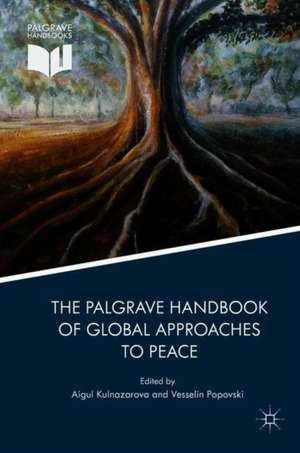The Palgrave Handbook of Global Approaches to Peace
Editat de Aigul Kulnazarova, Vesselin Popovskien Limba Engleză Hardback – 4 ian 2019
Preț: 1573.99 lei
Preț vechi: 1919.51 lei
-18% Nou
Puncte Express: 2361
Preț estimativ în valută:
301.22€ • 313.32$ • 248.68£
301.22€ • 313.32$ • 248.68£
Carte tipărită la comandă
Livrare economică 15-29 aprilie
Preluare comenzi: 021 569.72.76
Specificații
ISBN-13: 9783319789040
ISBN-10: 331978904X
Pagini: 717
Ilustrații: XXXVII, 765 p. 29 illus., 25 illus. in color.
Dimensiuni: 155 x 235 mm
Greutate: 1.29 kg
Ediția:1st ed. 2019
Editura: Springer International Publishing
Colecția Palgrave Macmillan
Locul publicării:Cham, Switzerland
ISBN-10: 331978904X
Pagini: 717
Ilustrații: XXXVII, 765 p. 29 illus., 25 illus. in color.
Dimensiuni: 155 x 235 mm
Greutate: 1.29 kg
Ediția:1st ed. 2019
Editura: Springer International Publishing
Colecția Palgrave Macmillan
Locul publicării:Cham, Switzerland
Cuprins
1. Framework for Global Approaches to Peace: An Introduction.- 2. Cosmopolitan Paths to Peace.- 3. Peace, R2P and Public Goods Theory.- 4. Gandhism and Peace.- 5. Feminist Continua in Peace and Conflict Studies.- 6. The Liberal Peace: Challenges to Development, Democracy and Soft Power.- 7. Human Security and the Socialization of Peace.- 8. Singapore’s Small State Domestic Peacemaking: “Quiet under the Banyan Tree”.- 9. Peace in Rwanda: Balancing the ICTR and “Gacaca” in Postgenocide Peacebuilding.- 10. Operationalizing Positive Peace: Canadian Approaches to International Security Policy and Practice.- 11. Russian Approaches to International Peace, Security and Institutions: Debating Within IR Schools.- 12. Reframing the Principle of Noninterference: Reflections of Chinese School Debates and Beijing’s Approach to Peace.- 13. Japan’s Thorny Path to Peace: Past,Present and Future.- 14. Building Peace Through Ubuntu in the Aftermath of Electoral Violence in Divided African Societies.- 15. Did Colombians Really Say “No” to Peace?: A Grassroots Peace Activism Versus Top-down Approach.- 16. Peace in Europe: The Role of the European Union in Peacebuilding and Security.- 17. Which “ASEAN Way” Forward?: Southeast Asian Perspectives on Peace and Institutions.- 18. A Latin American Approach to Peace: The Case of MERCOSUR.- 19. The African Peace and Security Architecture: An African Response to Regional Peace and Security Challenges.- 20. Official Discourses on Peace and Security in Post-Soviet Central Asia.- 21. International Women’s Organizations, Peace and Peacebuilding.- 22. The Role of Religious Institutions: Peace in Eastern Orthodoxy.- 23. The OECD Development Assistance Committee and Peace: Instituting Peace by Economic Means.- 24. The UN Security Council and Responsibility to Protect as Global Approach to Prevent Mass Atrocities.- 25. Peace Process, International Organizations and the “Kurdish Question”.- 26. The Role of International Organizations in Peace and Reconciliation in Kenya.- 27. Transnational Governance and Peace Processes: The Case of the UN and ICC in Colombia.- 28. Peace Institutions: Gandhism, Conflict Solution, Lifting the Bottom Up.- 29. Toward Engendered-Sustainable Peace to End Patriarchal Violence.- 30. Transitional Justice: Between Peacebuilding and Reconciliation.- 31. Peace, Politics and Religion.- 32. Approaching Peace Visually: Global Imaginaries and Narratives of Everyday Peacebuilding.- 33. In Search for Peace in the Arctic.- 34. International Norms and Future Peacebuilding.- 35.The Global Approaches and the Future of Peace Research.
Notă biografică
Aigul Kulnazarova is Professor of International Relations and International Law in the School of Global Studies at Tama University, Japan.
Vesselin Popovski is Professor and Vice Dean in the School of Law, as well as Director of the Centre for UN Studies, at Jindal Global University, India.
Textul de pe ultima copertă
With existing literature focusing largely on Western perspectives of peace and their applications, a global understanding of peace is much needed. Spurred by more recent debates and discourses that criticize the dominant realist and liberal approaches for crises in contemporary state- and peace-building, the contributors to this handbook emphasize not only the need to solve this eternal conundrum of humanity, but also demand—with the rise of increasingly more violent conflicts in international relations—the development of a global interpretive framework for peace and security. To this end, the present handbook examines conceptual, institutional and normative interpretive approaches for making, building and promoting peace in the context of roles played by state and non-state actors within local, national, regional, and global units of analysis.
Aigul Kulnazarova is Professor of International Relations and International Law in the School of Global Studies at Tama University, Japan.
Vesselin Popovski is Professor and Vice Dean in the School of Law, as well as Director of the Centre for UN Studies, at Jindal Global University, India.
Caracteristici
Introduces a truly global perspective on how different parts of the world think about peace through the voices of authors based in over 20 different countries Provides an innovative way to organize scholarship on peace-thinking, peace-making, and peace-building at different levels of analysis Zooms in on impact of local player/regional players in global peacebuilding through their participation in international institutions
